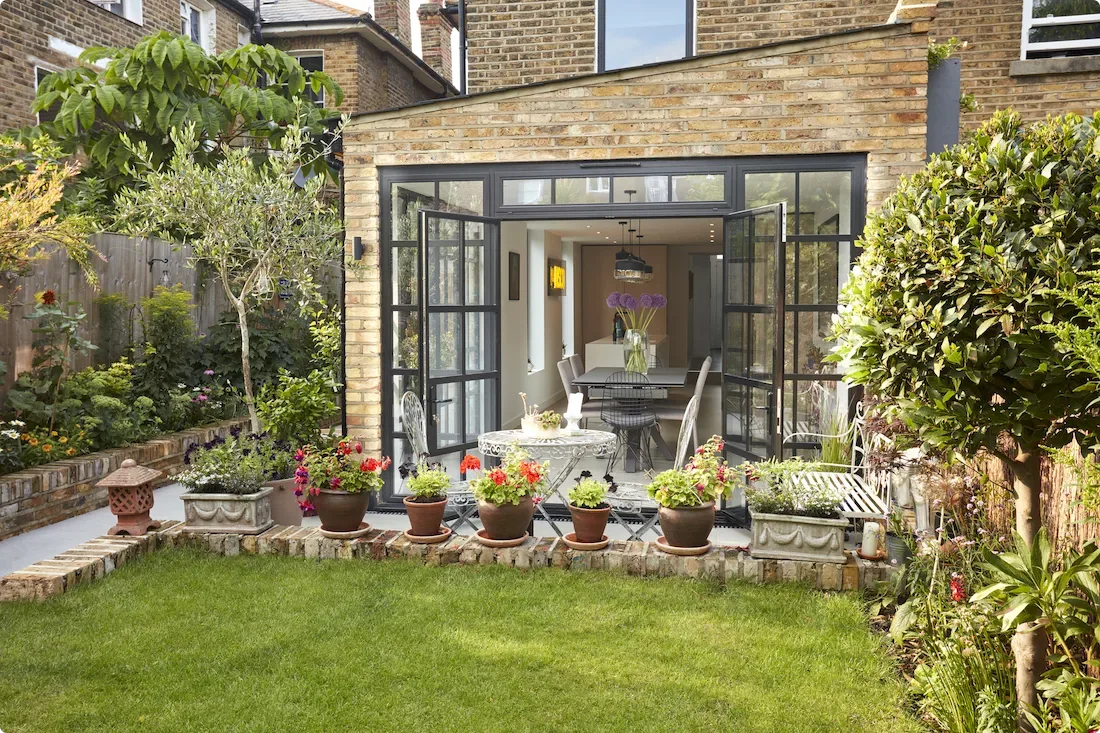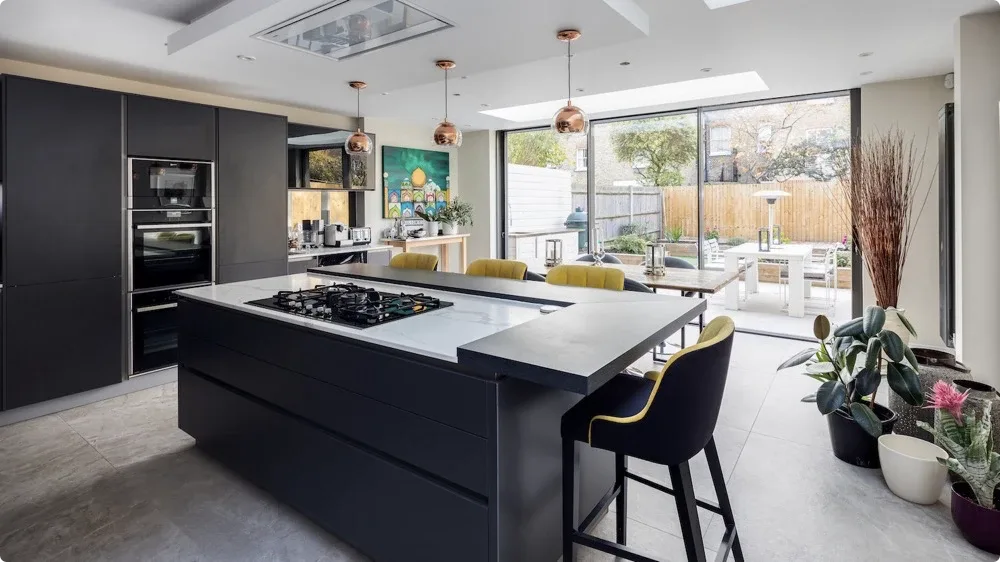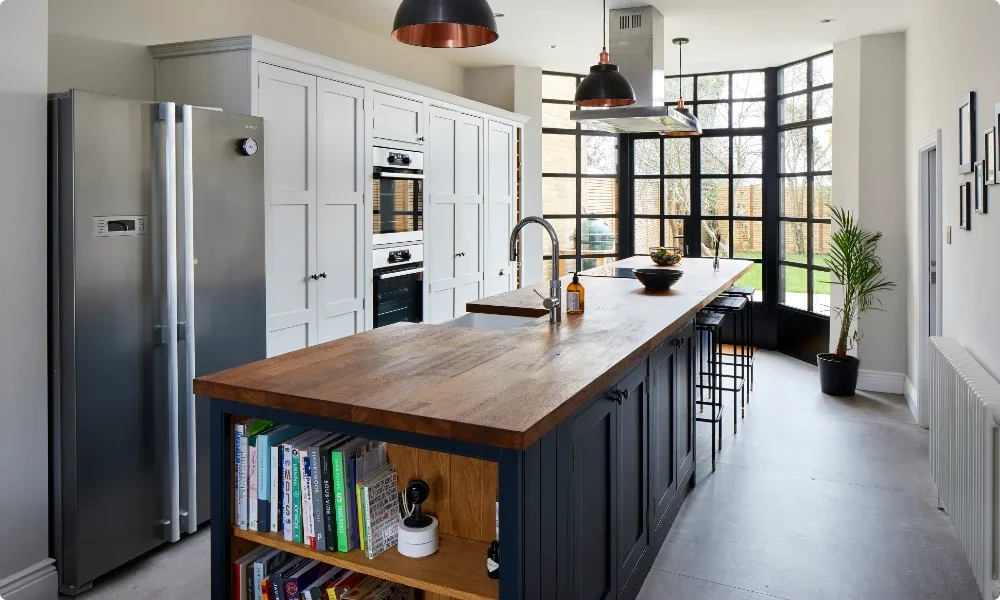Often referred to as the heart of the home, it’s no wonder kitchen extensions are one of our most commonly received requests. Not only do they open up a much used space, but a kitchen extension is a great way of adding value to any property. Depending on the size of the project, and your location, a kitchen extension cost can vary anywhere between £40K to £200K.
Now, you’re probably wondering why there’s such a wide price range. As with any home extension, there are plenty of factors that will affect your budget, including: location, extension type, size, complexity, materials, plus much more.
To help you get your budgeting spreadsheets in order, here’s what you’ll need to consider when trying to work out how much a kitchen extension costs.
How much does a kitchen extension cost to build?
The construction stage is where most (but not all) of your budget will be spent. Therefore, it’s useful to get to grips with these costs off the bat. The three defining factors for this stage of your project are: size and quality of your chosen contractor, the type of kitchen extension being constructed, and whether or not you live in or outside of London.
Here are rough estimates of how much it costs to build a variety of kitchen extensions.
Calculate the cost of your kitchen extension build.
Side return kitchen extension cost
| Contractor |
London Estimate (Ex. VAT) |
Outside London Estimate (Ex. VAT) |
| Low end |
High end |
Low end |
High end |
| Individual |
£52,000 |
£75,000 |
£43,313 |
£61,875 |
| Small Company |
£63,600 |
£90,000 |
£51,975 |
£74,250 |
| Large Company |
£68,250 |
£97,500 |
£56,306 |
£80,437 |
(for a 30 sqm extension)
The small but mighty option. To look at, a side return extension isn’t a huge add on to your property, but often generates a lot of new space within your kitchen. Not only that, they can be very reasonable in terms of cost.
Side return extensions bring your property out into an alleyway at the side of your home, if one is present. They’re often added onto period properties, especially those dating from the Victorian era. Side returns help transform your kitchen from a long and narrow space into a square-ish space with ample space to move around, or add a kitchen island. By adding rooflights or even fully glazing the extension, you can also add lots of natural light, making the space feel as bright and airy as it can be. A wonderful and often very popular option to go for.
Talk about your project to a Resi expert.
Ground floor rear kitchen extension cost
| Contractor |
London Estimate (Ex. VAT) |
Outside London Estimate (Ex. VAT) |
| Low end |
High end |
Low end |
High end |
| Individual |
£45,000 |
£75,000 |
£37,125 |
£61,875 |
| Small Company |
£54,600 |
£90,000 |
£44,550 |
£74,250 |
| Large Company |
£58,500 |
£97,500 |
£48,262 |
£80,437 |
(for a 30 sqm extension)
If you lack the space needed for a side return, you might consider a rear extension. This will take your kitchen out into your garden, meaning it's worth considering how much green space you’re willing to lose during the design stage.
Rear extensions are very popular. Not only can they bring in a lot of new space and light, but their design can often be kept simple, making this form of renovation cost-effective for your kitchen extension.
Wraparound kitchen extension cost
| Contractor |
London Estimate (Ex. VAT) |
Outside London Estimate (Ex. VAT) |
| Low end |
High end |
Low end |
High end |
| Individual |
£78,750 |
£112,500 |
£64,968 |
£92,812 |
| Small Company |
£94,500 |
£135,000 |
£77,962 |
£111,375 |
| Large Company |
£102,375 |
£146,250 |
£84,460 |
£120,657 |
(for a 45 sqm extension)
A combination of a side and rear extension, the wraparound gives a dramatic makeover to your kitchen. The extra space provided makes open plan living a dream, as you can easily combine your living, kitchen and entertaining areas with your new addition. Perfect for growing families.

Conservatory/Orangery kitchen extension cost
You can open out your dining space with a conservatory or orangery extension. They’re popular not only because they bring in reams of natural light, but often cost less than traditional extensions. They are generally formed off-site, making the whole process much more efficient.
A conservatory kitchen extension will vary in price, depending on both the size, what kind of roof you select, and whether you’re converting an existing structure or building from scratch.
Conservatory: new build
| Roof material |
Polycarbonate roof |
Glass roof |
| Small (3.5x2 sqm) |
Large (4x2.5 sqm) |
Small (3.5x2 sqm) |
Large (4x2.5 sqm) |
|
£7,000 - £8,000 |
£9,000 - £10,000 |
£7,000 - £8,000 |
£9,500 - £15,000 |
Conservatory: refurbishment
| Roof material |
Polycarbonate roof |
Glass roof |
| Small (3.5x2 sqm) |
Large (4x2.5 sqm) |
Small (3.5x2 sqm) |
Large (4x2.5 sqm) |
|
£4,500 - £5,000 |
£5,000 - £5,750 |
£4,750 - £5,250 |
£5,000 - £5,750 |
Orangery
| Size |
Small (4x4 sqm) |
Medium( 4x4 - 6x6 sqm) |
Large (7x7m +) |
| Cost estimate |
£5,000 - £18,000 |
£12,000 - £30,000 |
£18,000 - £100,000 |
What affects a kitchen extension's cost?
Your kitchen extension cost will be informed by more than just your build, and there are plenty of factors to consider when it comes to estimating a reliable budget.
The cost of your kitchen extension will depend on…
- The size of your extension
- Your location in the UK
- Complexity of the design
- Quality of your materials
- Professionals required
- Size and quality of your contractor company
Get a free quote for Resi's kitchen extension services.
Breakdown of kitchen extension costs
Alongside construction, there are plenty of costs that go into your total budget. While you can get a rough estimate of crunching the numbers yourself, on the whole, we highly recommend talking to an expert to get the full picture.
At Resi, we not only offer free design consultations, we also have in-house specialist brokers who can guide you through your funding options.
However, if you still want to get a basic idea of what will affect the costs of your kitchen extension, here’s what to bear in mind on top of your construction costs…
Kitchen extension design cost
Traditional architects tend to charge fees between 5% - 15% of construction costs, depending on whether or not you have them project manage your kitchen extension.
At Resi, our overall design costs are around 4% of your budget, and can range between £2000 - £8000, depending on the size and complexity of your project.
Calculate how much your kitchen design would cost.
Kitchen extension planning permission cost
When applying for planning permission you should know costs for planning permission differ, depending on where you are in the UK. However, for a kitchen extension, they roughly work out at around £528 for a full planning application for one dwelling. This includes your application fee but does not include any drawings required to submit to the local authority.
Get a quote for your kitchen extension drawings.
If you plan on adding what is classed as a ‘larger rear extension’ to extend your kitchen, you can use your permitted development rights but you will need to obtain prior approval from your local planning authority. This will cost around £240 for your application.
Fittings for your kitchen extension
As a rule of thumb, most people spend between 2-5% of their property’s value on their kitchen extension fittings. As an example, if your property is valued at £400,000, you’ll likely spend an average cost of £8,000 - £20,000 on your new kitchen interior.
Where does all this money go? Here’s a breakdown of what these costs cover…
- Cabinets (30%)
- Countertops (10%)
- Appliances (15%)
- Plumbing (5%)
- Electrics (5%)
- Flooring (5%)
- Other (10%)
- Labour, plus contingency (10%)

Cost of kitchen extension building regulations
Building regulations are a legal requirement for all kitchen extensions. At minimum, you’ll need to consult a structural engineer, especially if you’re adding an extension. However, if you want to properly protect your project, we always recommend you commission a full building regulations package. These highly-detailed technical drawings will map out everything your contractor will need to create a fully compliant final product, and will consist of input for several home specialists.
Here are the professional fees your package will need to cover…
- Resi’s building regulation package starts from £775 and is determined by the size and complexity of your project
- A structural engineer typically costs £950-2500
- An approved inspector £900-2000
- CCTV drainage survey £250-350
How can I pay for a kitchen extension?
There are several ways to fund a kitchen extension, and as with all big investments, it really helps to talk to an expert about your options. At Resi, our specialist brokers can help you assess your options and find the right funding route for your kitchen extension.
If you're curious about what options are available, here are the three most common financing routes for extending your kitchen.
Savings
Pros: If your savings are able to cover the costs, you’ll be able to rest easy knowing that you’ll have no extra budgeting to do at the end of your project, as no repayments or interest will be involved.
Cons: Putting together a large sum of money can take time and you might find as you put more and more money away, the cost of your dream kitchen extension also escalates. Don’t forget, inflation affects the cost of labour and materials each and every year!
Using an unsecured personal loan
An unsecured personal loan works best for small kitchen extensions. You don’t want to be taking on long-term debt of more than £30,000 with this route, otherwise you could face some pretty scary repayment plans.
Pros: You can choose a short-term plan to pay off your debt and won’t have to cover the cost of set-up fees.
Cons: If you have a bad credit history or the market is struggling, it’ll be difficult to secure a good rate. The interest rates will also be unfavourable and limited for projects above £30,000. As this is short term lending, typically over 2-5 years, the repayment amounts can be quite high.
Remortgaging or using a further advance
For anyone taking on a major kitchen extension that costs more than £30,000, it’s recommended you utilize the equity in your house to secure the funds. This could either be through a remortgage of your property or what’s known as a ‘further advance’.
Pros: For big projects, using the equity in your home can often provide the best interest rates long-term. If done correctly, you’ll also be able to use the value your project creates to get the best deal.
Cons: Depending on when you’re looking to remortgage, you might find the deals on offer significantly less favourable than your existing mortgage. Remortgaging might also not be an option for smaller works.
Find out more about financing your project.























